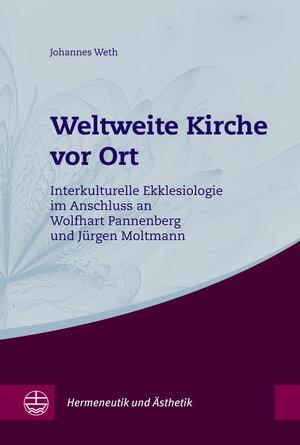
×
![Buchcover ISBN 9783374071807]()
Weltweite Kirche vor Ort
Interkulturelle Ekklesiologie im Anschluss an Wolfhart Pannenberg und Jürgen Moltmann
von Johannes WethDie weltweite Kirche ist nicht länger ein rein globales Phänomen. Die wachsende Präsenz der weltweiten Geschwister in der eigenen Nachbarschaft verändert die Ausgangssituation kirchlicher Selbstreflektion nachhaltig. Zugleich schreitet die Entwicklung weiter voran. In »postmigrantischer« Perspektive verlieren auch die althergebrachten Differenzkategorien der Herkunft und der kulturellen und konfessionellen Zuordnung ihre Plausibilität. Hat damit auch die dogmatische Grundlegung von Kirche ausgedient?
Die Studie geht einen anderen Weg. Sie konfrontiert empirisch-soziologische Wirklichkeit und etablierte ekklesiologische Einsichten der Entwürfe Wolfhart Pannenbergs und Jürgen Moltmanns wechselseitig und entwickelt so dynamisch-kreative Spannungsfelder interkultureller Ekklesiologie und Kirchentheorie.
[Worldwide Church locally. Intercultural Ecclesiology in reception of Wolfhart Pannenberg and Jürgen Moltmann] The worldwide church is no longer purely a global phenomenon. The growing presence of global christian brothers and sisters in the own neighbourhood is significantly changing the starting point for Church´s self-reflection. At the same time, the shift continues. In a „post-migrant“ perspective, the traditional categories of difference of origin and of cultural and denominational classification are losing plausibility as well. Does this mean that the dogmatic foundation of the church is obsolete, too? The study takes a different approach. It confronts empirical-sociological reality and established ecclesiological insights of Wolfhart Pannenberg's and Jürgen Moltmann's programmes mutually and thereby develops dynamic-creative fields of tension of intercultural ecclesiology and church theory.
[Worldwide Church locally. Intercultural Ecclesiology in reception of Wolfhart Pannenberg and Jürgen Moltmann] The worldwide church is no longer purely a global phenomenon. The growing presence of global christian brothers and sisters in the own neighbourhood is significantly changing the starting point for Church´s self-reflection. At the same time, the shift continues. In a „post-migrant“ perspective, the traditional categories of difference of origin and of cultural and denominational classification are losing plausibility as well. Does this mean that the dogmatic foundation of the church is obsolete, too? The study takes a different approach. It confronts empirical-sociological reality and established ecclesiological insights of Wolfhart Pannenberg's and Jürgen Moltmann's programmes mutually and thereby develops dynamic-creative fields of tension of intercultural ecclesiology and church theory.



